Workshops
The Bachelor of Arts (Fine Art) has a two-stage enrolment process. In stage one, you will enrol via Enrolment Online into our courses for semesters one and two. In stage two, you will select your semester one classes for Fine Art Studio and Workshop classes, and semester one and two classes for ART: History+Theory+Cultures via a preferencing process.
This page will assist you with stage two of the enrolment process. Here you will find a list of potential semester one Workshop classes. (Note: There is a separate page for Fine Art Studio classes and a separate page for ART: History+Theory+Cultures classes.) You will only take one Workshop class in semester one, but you need to list two (2) preferences. These workshops will be for both second and third year students and will be offered under the following course codes:
Workshop 3 VART 3651 (2nd year students)
Workshop 5 VART 3653 (3rd year students)
These are the course codes you enrolled into in stage one of the process.
Read the list below carefully and select two Workshop classes you would be happy to take for semester one. The 2019 preferencing process will be communicated to you by email later this year.
Remember these Workshop classes are 12 credit point courses and will require 3 contact hours per week plus associated learner directed hours.
IMPORTANT – You must not repeat any class in your preference lists. Every effort will be made to place you in your first preference classes.
Please note: although we would like to offer all of the Workshop options below, classes are subject to viability and may not run if numbers are too low.
Course Information
Offering Studio
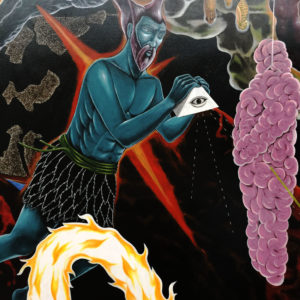
Rodel Tapaya, Do You have a rooster, Pedro? 2015 – 16, Acrylic on canvas, Art Gallery of New South Wales
Art and Mythology in a Contemporary Context
This workshop investigates the longstanding traditions of mythology in visual art. You will be encouraged to rework ancient mythologies from many possible cultures, employing a painting, drawing and mixed media practice. Throughout all cultures and histories artists have interpreted and reworked ancient mythologies as major themes to explore the human condition. Contemporary artists continue to reinterpret an array of multi-cultural mythologies into new personal iconographies and as strong metaphors for contemporary life.
You will explore ideas of classical mythology, modern mythmaking, cultural ledgends, personal mythologies, hybrid transformations, fictional landscapes and visions.
You will research and explore ideas of narrative, working in series, and the symbolism of mythology to develop a contemporary studio practice.
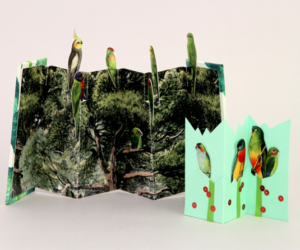
Jazmina Cininas, 2017
Book as Art Object
This Workshop has been designed to provide Fine Art students with an expanded understanding of the book as a vehicle for artistic expression, through exploring the relationship between binding method and content. In this class, you will explore the possibilities offered by the artist’s book for the presentation of visual information and ideas through expanded notions of the book. A broad range of book binding techniques incorporating both adhesive and non-adhesive book binding methods will be introduced in face-to-face studio workshops, supplemented by lectures, excursions and peer-to-peer learning that will help to advance concepts and content as you create your own original book-based art objects
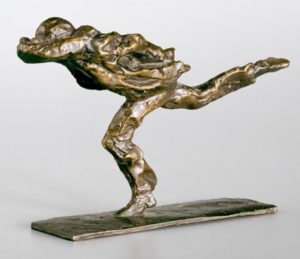
Rick Amor Running Man, 1989, NGV Collection
Bronze Foundry
In this course you will develop practical skills across a range of processes and materials commonly used in sculptural practice in the bronze foundry. You will be introduced to methods and materials involved in lost wax casting in order to make small bronze works. This method involves the completion of a series of steps from wax modeling, plaster and sand investments, melting and pouring bronze, finishing and patination. You will undertake these steps in sequence and as a group and this will requires hands-on attendance at all classes. The course is mainly practical but with appropriate tutorial presentations covering theoretical and relevant historical background.
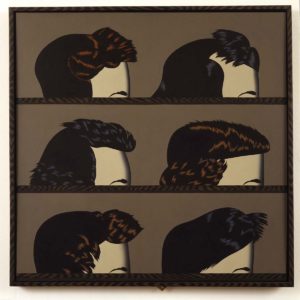
Christina Ramberg, Glamour Guide, 1973, Acrylic on masonite
Contemporary Figuration
In this studio based workshop you will investigate a diverse range of conceptual and technical aspects of figuration. Through a series of projects you will experience the human image and the broader framework of the real, the landscape, the natural world and the body. Using strategies such as observation, models, reproductions and film as source material you will develop an individual approach to contemporary figuration.
You will investigate ideas of narrative, distortion, movement, emptiness, and trace as form and content, in a way that explores the unique place of figuration in contemporary art. This workshop will enable you to explore the relationship between painting, drawing, photography, social media and film.
Research and experimentation is a core strategy of the workshop leading to a group of individual resolved artworks.
Visual lectures, individual and group tutorials, field trips, and demonstrations complement this workshop.
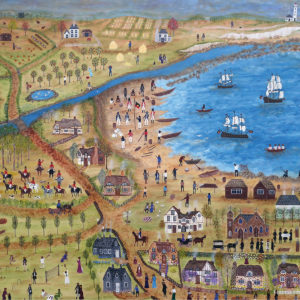
Marlene Gilson, What If, 2017
Drawing Concepts
In this workshop course you will explore uses of drawing relevant in contemporary art practice ranging across picture making, narrative and meaning, embodied and situated knowing and social practices.
You will investigate thematic and self-directed projects that extend the consequences of drawing for your emerging practice developing your formal and conceptual understanding of drawing as a mode and tool of enquiry, research, collaboration and expression.
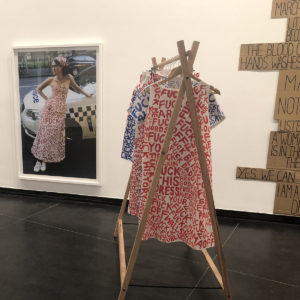
Ruth O’Leary, Fuck Dress, 2018, Australian Centre for Contemporary Art, installation view
Drawing and Body
In this workshop course you will explore drawing techniques of the body and approaches to perceiving and expressing the body in space, the body as political action, as vessel, sign and as site of meaning.
You will investigate thematic and self-directed projects addressing self and personal vision within your emerging art practice through drawing and related practices that are relevant to a range of areas of study.
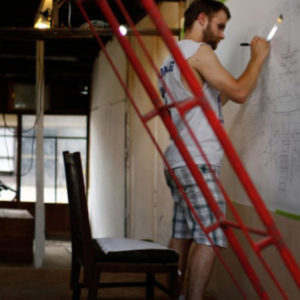
STUDENT on site, PHOTOGRAPHY Tammy Hulbert, N.D.
Internship
In this course, you will participate in an internship or artist in residence program in an arts or cultural organisation, company, festival, gallery, museum or studio, through dual negotiation with the industry and the School of Art. You will be expected to work as directed by the host organisation, to address and solve real issues in an arts industry workplace environment.
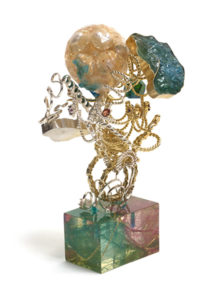
Nina Oikawa, 2016
Jewellery Attachments
In this course, you will use your current jewellery skills to explore how the notion of attachment can be applied to jewellery making to incorporate non-metallic materials. You will examine how the gemstone, both semi-precious and artificial, can be invigorated and repositioned in a contemporary art jewellery context. You will first investigate methods of stone setting and you will then extend this knowledge by experimenting with different ways of attaching non-metal to metal.
You will develop your own personal approaches to the inclusion of other materials in jewellery objects and you will look at how the found object can extend the meaning of the work. You will rethink historical and cultural perceptions of jewellery value through the making of new jewellery works.
This course is suited to students from Gold & Silversmithing and those who have taken the elective Jewellery Fundamentals. You will need jewellery tools, PPE and materials including silver in this course, please email the Gold & Silversmithing Studio Leader for more details.
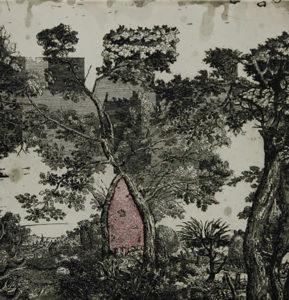
Outside In 2017, Rob Dott, photographic etching, dimensions 20cm x 20cm
Photographic Etching
In this course you will develop an understanding of analogue and digital technologies focusing on intaglio etching, with an emphasis on photographic imagery and processes. Lectures and workshops will provide a mixture of theory and technical skills enabling you to produce works and reflect on the role of traditional and electronic print media in contemporary art. This will help you to expand the aesthetic and conceptual possibilities of your art practice.
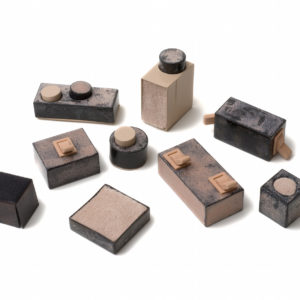
Aphra Cheeseman, 2018
Silversmithing Positions
In this course you will use your current Gold & Silversmithing skills to explore making and fabrication. You will examine how vessels and metals can be invigorated and repositioned in a contemporary context. You will first investigate and research methods of alloying sheet and wire and using both heat and cold joining to experiment with new methods of building original Silversmithing objects.
You will develop your own personal concepts and approaches to the Silversmithing object by rethinking historical and cultural perceptions of the vessel.
This course is suited to students from the Gold & Silversmithing studio area. You will need Gold & Silversmithing tools, PPE and materials in this course, please email the Gold & Silversmithing Studio Leader for more details.
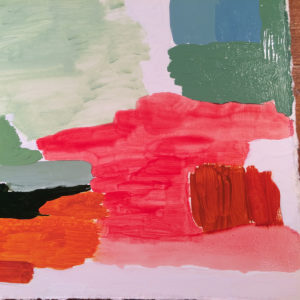
Robin Kingston, Untitled: Pink and Green (Detail), 2017, Oil on gesso on paper
So you want to be a Painter?
In this workshop, you will investigate the understanding of issues, strategies and processes used by painters. How do painters research and then produce resolved works? What processes do they use? How do they go about finding information both visual and literary to investigate the issues in their practice? We will investigate these issues in order for you to identify content and strategies in your own practice and to put them to use. How does a painter generate a practice so that it does not become repetitive and about style? How do you investigate the notion that each work has its own issues and its own solution? How is work presented and how does this affect content? What is the body of work that sits underneath a resolved work? The focus of this workshop will be to investigate these issues through the use of traditional media of works on paper, studies and painting, through time based practice and through ephemeral installations and objects.
You will experience a series of procedures and processes that will guide you towards an individual, sustainable practice that complements your fine art studio.
You will take part in trial installations, student presentations, appropriate gallery visits, individual and group tutorials.
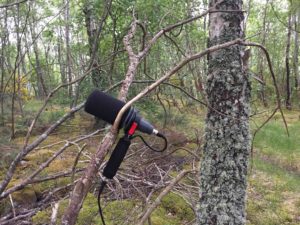
Philip Samartzis, N.D.
Sound Art
In this course you will examine technical, historical and theoretical aspects of Sound Art practice. The course encourages you to develop skills in critical listening and a dialogue between your practice and the history of Sound Art, as they relate to installation, composition, performance and other audio modes of exhibition and distribution.
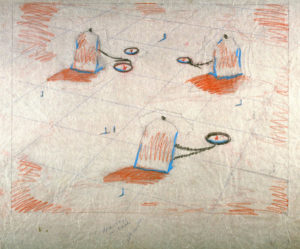
Claes Oldenburg, Colossal Teabags in City Square, 1976, Crown Point Press Archive, Museum purchase, Gifts of Several Donors
Spatial Drawing
In this workshop course you will explore the drawing processes artists employ to develop their ideas in relation to the places we inhabit and encounter, ranging across personal, experiential, and social perceptions of space.
You will develop practical drawing-based methods to investigate small and large-scale forms, specific objects, spatial environments and actual locations in relation to your personal vision and individual studio and installation projects.
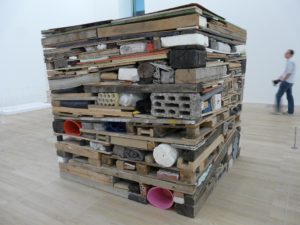
Tony Cragg, Stack, 1975, Tate Modern
The Readymade, Recycled and Hybrid Object
This course uses the strategy of collage to create sculptural works from existing objects and materials. It involves deconstructing and reconstructing objects, connecting incongruous forms and creating new relationships between materials. You will be encouraged to collect and recycle your own materials. This workshop aims to give you the skills and hands-on experiencing to enable you to develop work with strong conceptual and sculptural properties whilst giving you the freedom and encouragement to develop your own projects. This will be supported by hands-on sessions exploring sculptural techniques and processes such as casting, joinery and welding.
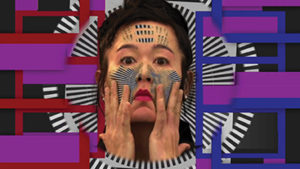
Hito Steyerl, How not to be seen, N.D.
Video Art
In this course you will examine technical, historical and theoretical aspects of video art practice. The course encourages you to develop a critical dialogue between your studio practice and the language of video art, as they relate to installation and screening-based modes of exhibition. Technical skills include advanced camera use, lighting, performance and editing.
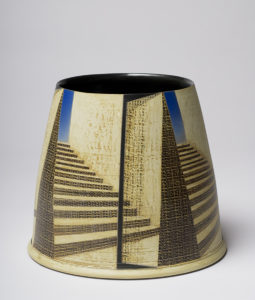
Garry Bish, 2018
Wheel thrown ceramic form and glaze
In this ceramic course, you will be exploring the symbiotic relationship of wheel-thrown forms and glaze technology. Through a series of projects, you will use wheel forming techniques to develop a range of shapes that express a familial connection. Glaze research will further this personal approach with an investigation of materials that influence surface and additives that inspire glaze character. The course will promote an individual vision manifest as a group of new ceramic forms.
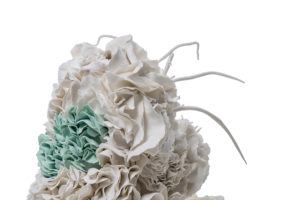
Lucinda Kirkby, 2017
Working with Porcelain
In this ceramic course, you will work with and explore the unique qualities of porcelain. The fineness and tactility of this material allows for the production of smaller scale ceramics. You will engage in a series of projects and technical explorations that will generate a personalised vocabulary of porcelain textures and forms. You will begin with an intensive project that will promote you to be experimental and explorative with this material. You will then engage with a larger project, or series, where you will be able to synthesize these discoveries into a body of completed ceramic works.